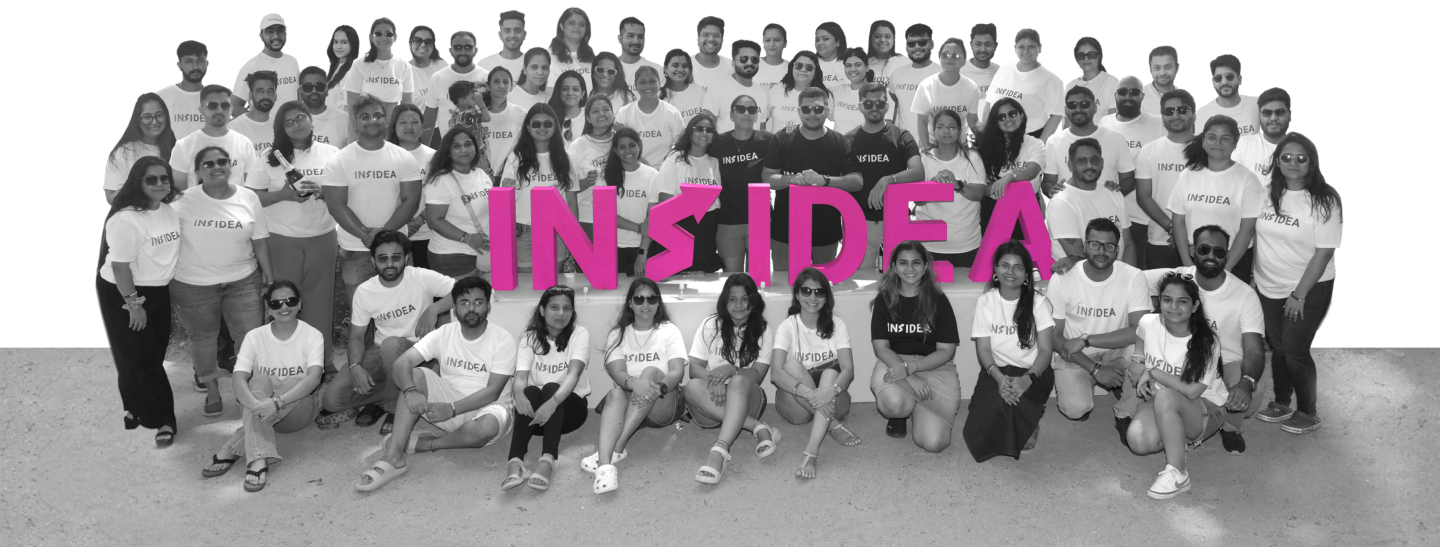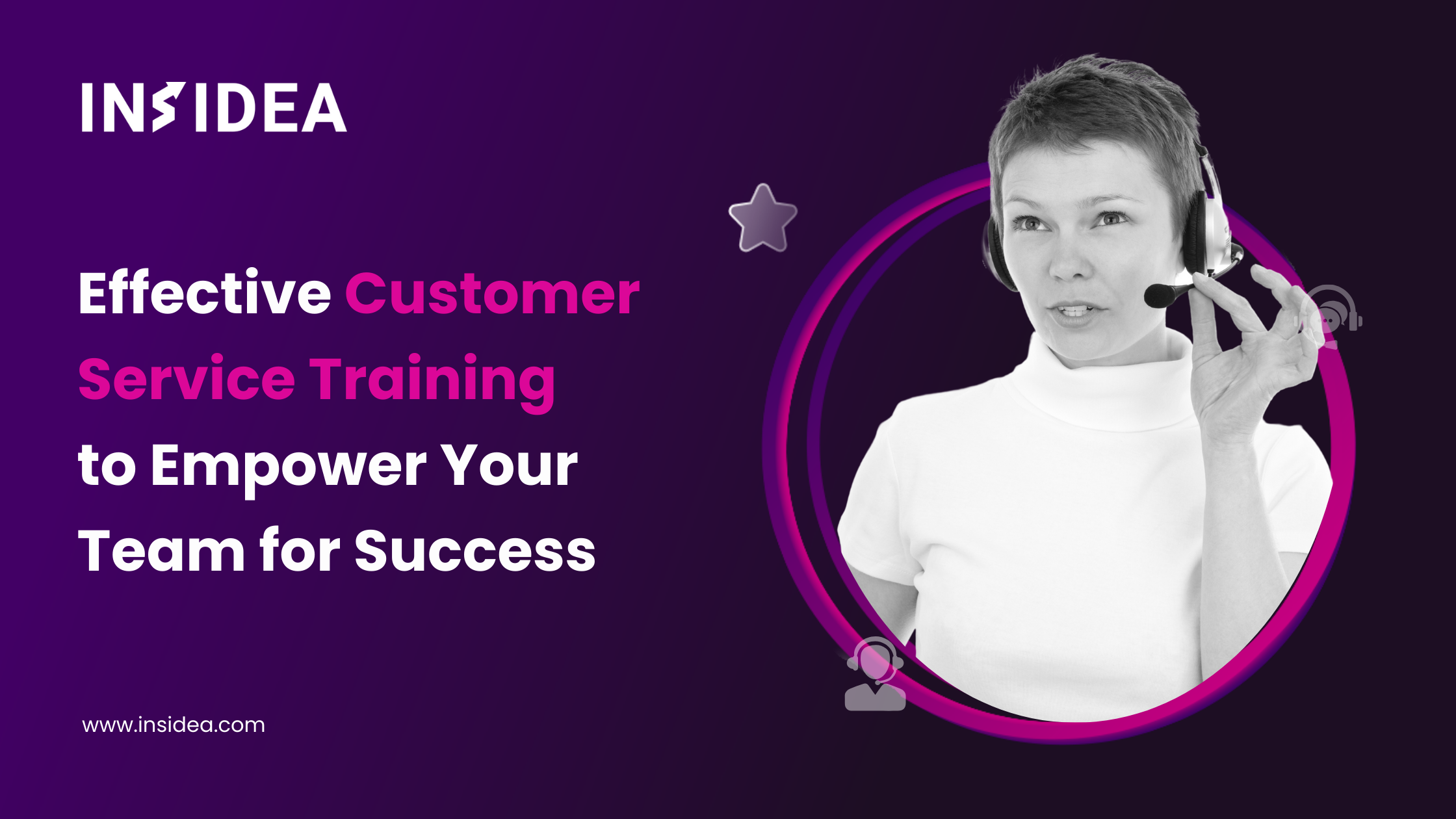In an era where customer expectations continually evolve, robust customer service training must be emphasized more. It’s not just about retaining customers or minimizing employee turnover; it’s about sculpting the very essence of a customer-centric organization.
A compelling 90% of Americans assert that customer service is a decisive factor in their company choice. This underscores the profound impact of quality training on agent performance and overall customer satisfaction.
As we go through this blog, we will explain the particulars of good customer service training, its many benefits, and the steps you need to take to make a program that works.
What is Customer Service Training?
Customer service training teaches employees how to better support and satisfy customers. This training covers essential areas like communicating well, knowing the product inside out, handling disagreements, and managing tough situations.
It’s a continuous learning process designed to equip all employees, no matter their role or experience, with the right skills to serve customers effectively. Whether in marketing, management, or direct customer service roles, every team member keeps customers happy. After all, happy customers are key to a business’s growth.
Why Is Customer Service Training So Important?
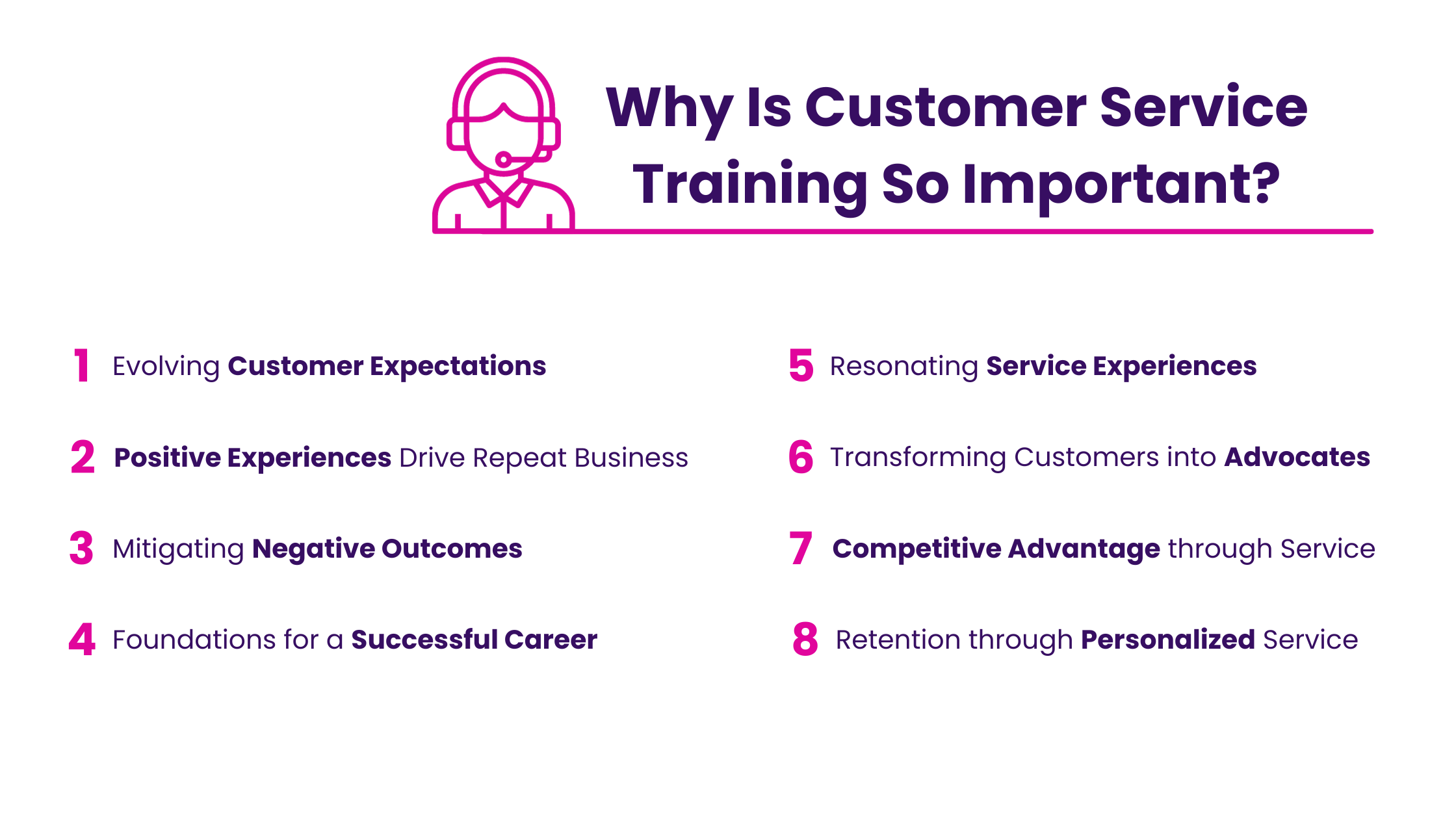
Customer service has evolved beyond simple interaction in the constantly evolving business world. It has evolved into a crucial touchpoint that can make or ruin a company’s relationship with its customers. As industries evolve and consumer expectations change, the significance of providing service representatives with the proper tools and information has never been greater. The following points explain why customer service training is advantageous and essential for businesses seeking sustained growth and customer loyalty.
1.Evolving Customer Expectations
Consumer goods, retail, and other sectors known for their high standards of service have an impact on changing customer expectations. Training ensures that your team is always aligned with these evolving expectations.
2.Positive Experiences Drive Repeat Business
Most customers indicate that a positive service experience makes them more inclined to make another purchase. Training ensures that customers consistently receive these positive experiences.
3.Mitigating Negative Outcomes
Poor service can lead to negative outcomes, from social media complaints to damaging reviews. Proper training can help avoid these pitfalls and retain customers who might be lost after a bad experience.
4,Foundations for a Successful Career
For many agents, quality training aligns them with a company’s ethos and lays the groundwork for a prosperous career in customer support.
5.Resonating Service Experiences
Good customer service has a lasting impact. It’s not just about solving problems; it’s about forming connections. It is argued that most people are more likely to return after a positive service experience.
6.Transforming Customers into Advocates
Exceptional service turns satisfied customers into brand advocates. With 94% of people recommending companies that offer “very good” service, it’s evident that customer service can be a potent marketing strategy.
7.Competitive Advantage through Service
Outstanding customer service can be a differentiator. Data suggests that customers are quick to leave after bad experiences, but with consistently good service, they are more forgiving and loyal.
8.Retention through Personalized Service
Personalization is no longer a luxury but an expectation. Three-quarters of consumers expect tailored experiences. Training ensures service representatives can offer this personal touch, leading to higher customer satisfaction and recommendations.
By investing in customer service training, businesses are enhancing their service delivery and building a foundation for long-term success, loyalty, and growth.
Who Requires Customer Service Training?
Customer service training is required if an employee’s responsibilities include assisting consumers with problem resolution. Their titles may include client success specialist, support engineer, and customer service representative. Or an industry-specific term such as patient advocate, consumer expert, support ninja, or cast member. Regardless of their title, these team members interact with customers and require instructions on how to assist them most effectively and compassionately.
What Should Customer Service Training Include?
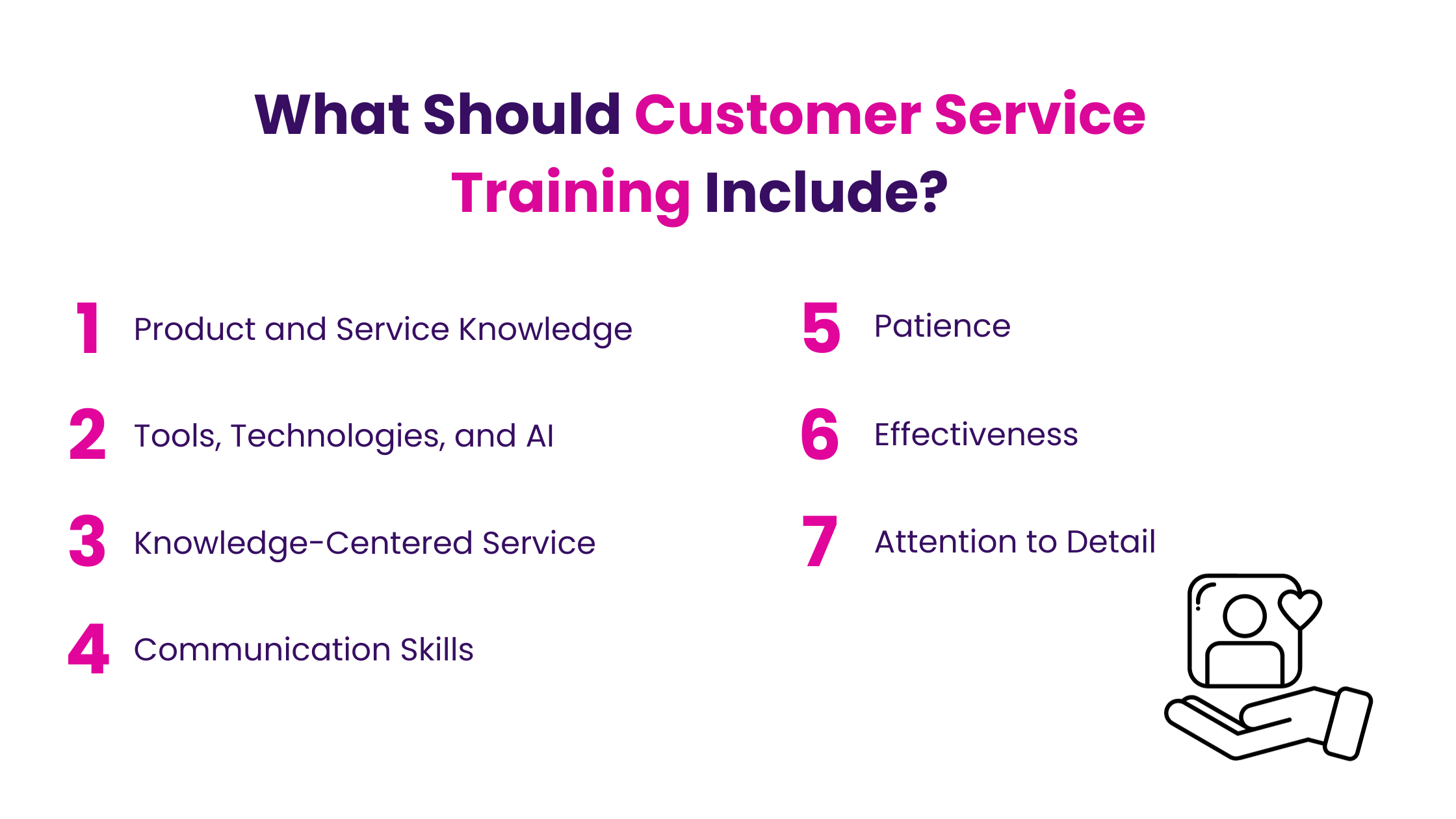
Customer service is a pivotal touchpoint in business, shaping the overall customer experience. Ensuring that service representatives are well-equipped and knowledgeable is crucial. A comprehensive customer service training program encompasses both hard and soft skills tailored to meet the ever-evolving demands of the customer. Here’s a closer look at the essential components of such a program:
1.Product and Service Knowledge
Customers expect service agents to be well-versed in the company’s offerings. Engaging in training methods, such as quizzes and team competitions, can make the learning process more interactive and effective.
2.Tools, Technologies, and AI
With the rise of technology, agents must be adept at using CRM software and AI tools. These technologies centralize customer data and enhance the overall service experience.
3.Knowledge-Centered Service
KCS is a proactive approach that revolves around continuously collecting and analyzing customer information. This method resolves issues and anticipates potential problems, ensuring a smoother customer journey.
4.Communication Skills
Clear communication is the backbone of effective customer service. Agents should be trained to break down complex information into digestible bits, ensuring clarity and trust.
5.Patience
Empathy and patience are vital in handling customer concerns. Training should emphasize understanding the customer’s perspective, especially when dealing with complex or frustrating issues.
6.Effectiveness
Efficiency and effectiveness go hand in hand in customer service. Agents should be trained to value the customer’s time, anticipate issues, and offer swift resolutions.
7.Attention to Detail
Every customer interaction is unique, and attention to detail ensures no crucial information is overlooked. Training programs should incorporate methods to hone this skill, ensuring that agents capture all necessary details during interactions.
In conclusion, a well-rounded customer service training program is the cornerstone of delivering exceptional customer experiences. By focusing on hard and soft skills, businesses can ensure that their service representatives are knowledgeable, empathetic, and efficient. Such training is an investment in long-term customer loyalty and business success.
Types Of Customer Service Training
Continuous training methods remain paramount to ensuring service representatives have the latest skills and knowledge. Various training methodologies cater to different learning styles and organizational needs. Here’s an in-depth look at five prominent types of customer service training:
- Electronic Performance Support Systems (EPSS)
EPSS technology offers a self-guided approach, enabling users to seamlessly navigate tasks, retrieve information, and present data. Integrated with online platforms, EPSS provides interactive elements like pop-ups and icons, presenting information through videos, text, images, or data.
- E-Learning
E-learning platforms can be accessed from anywhere with an internet connection, which helps to offer convenience and accessibility. They often encompass learning management systems, facilitating the distribution and tracking of training. However, ensuring these platforms encourage active participation is essential for effective retention.
- Instructor-Led Seminar or Workshop
The efficacy of this method largely hinges on the instructor’s expertise. Optimal instructor-led sessions promote dialogue, problem-solving, and knowledge dissemination. However, they may pose challenges regarding time, cost, and logistical constraints.
- Webinars or Online Teacher-Led Training
Webinars offer a blend of e-learning and instructor-led sessions. They can be live broadcasts or pre-recorded sessions, and they frequently come with presentations, demonstrations, or slides. The interactive nature of webinars, whether live or on demand, typically allows for queries and discussions.
- In-Person Team or Peer Training
This hands-on approach encompasses mentorship programs, lunch and learns, role-playing, and group coaching sessions. Such methods are instrumental in fostering upskilling and cross-skilling among agents, promoting a collaborative learning environment.
The choice of customer service training methodology should align with the organization’s objectives, the learners’ preferences, and logistical considerations. By investing in the right training approach, businesses can ensure that their customer service representatives are not only well-informed but also adaptable to the ever-changing demands of the industry.
What Skills to Look For When Hiring for Customer Service?
In the space of customer service, hiring the right talent is paramount. The ideal candidate should possess technical know-how and embody the soft skills essential for creating memorable customer experiences. As you embark on the hiring process, here are some pivotal skills to prioritize:
1.Emotional Intelligence
Central to customer service is the ability to understand and empathize with customers. Candidates should be adept at listening, understanding diverse problems, and connecting emotionally. A potential question to gauge this skill might be: “Can you tell me about a time you tried to do something and failed?”
2.Good Communication
Effective communication is the bedrock of customer service. Candidates should be proficient in breaking down complex issues and guiding customers. To assess this skill, consider asking: “How would you explain a complicated technical problem to a colleague with less technical understanding?”
3.Resourcefulness
A resourceful candidate is proactive and solution-oriented.Instead of admitting defeat, they seek answers and alternatives. To evaluate resourcefulness, you might ask: “Describe a time when you faced a significant obstacle to succeeding with an important work project or activity. What did you do to solve it?”
4.Passion
While not strictly a skill, passion is integral for those aiming to excel in customer service. Candidates should exhibit enthusiasm for assisting customers and contributing to the company’s success. To gauge their passion, consider inquiring: “When have you been most satisfied with your work at your previous company?”
Thus, hiring the right talent for customer service is akin to laying a strong foundation for a building. By prioritizing these skills during the hiring process, businesses can ensure a team that addresses customer concerns effectively and contributes to building lasting relationships.
Unlock Customer Service Excellence with INSIDEA’s Expertise!
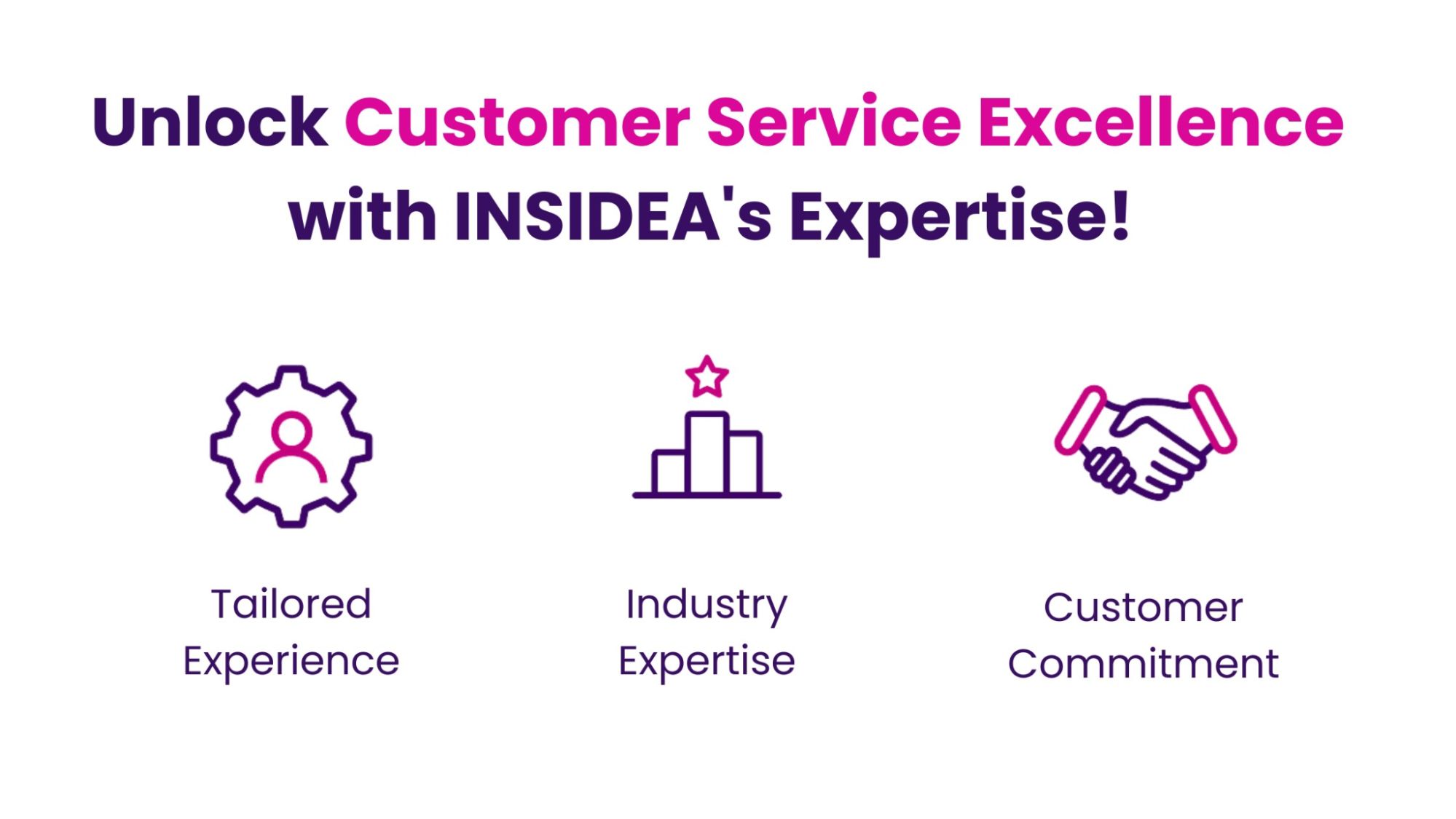
Effective customer service training is a non-negotiable part of building a business that not only survives but also thrives. It’s about more than just teaching your team to smile and be nice; it’s about equipping them with a deep understanding of your products, the finesse to use the latest tools, and the soft skills to genuinely connect with customers. And when you’re hiring, look for those with emotional smarts, communication chops, and the kind of resourcefulness and passion that turn problems into praise. Invest in your people, and they’ll invest their best in your customers—and that’s the kind of cycle that leads to lasting success.
Are you ready to transform your customer service and take your customer experience to the next level? INSIDEA is here to guide you through every step of the way, ensuring that your support team is empowered to deliver exceptional service.
As experts in customer support solutions, we pride ourselves on helping businesses optimize their support strategies for maximum efficiency and customer satisfaction. Reach out today to discover how INSIDEA can revolutionize your customer support and contribute to your business success!
Tailored Support Strategies: At INSIDEA, we understand that every business is unique. That’s why we work closely with you to develop customized support strategies that align with your specific needs and goals.
Industry Expertise: Our team brings a wealth of experience and industry knowledge to the table, ensuring that you have access to the best practices and insights in customer support.
Customer Commitment : Your customers’ happiness is our top priority. We are dedicated to helping you exceed their expectations and foster long-lasting relationships.
Ready to elevate your customer support experience? Book a meeting with our experts today and start your journey towards outstanding customer service and satisfaction.


